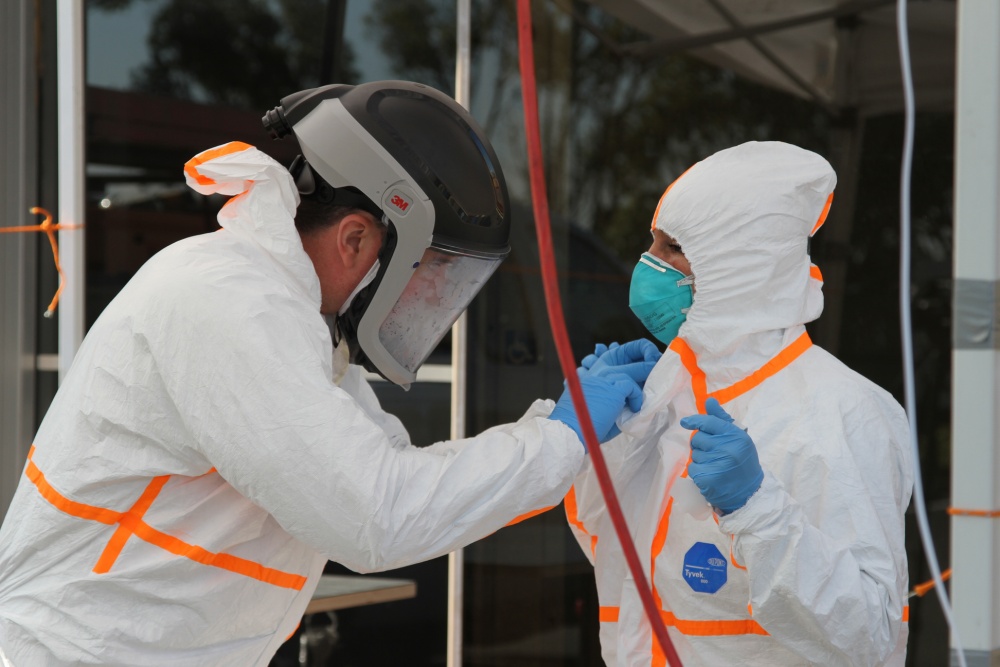Illinois Latino COVID-19 Initiative
Latino Leaders launched a Latino COVID-19 Initiative due to impact COVID-19 in the Latino Communities
Chicago. Illinois. April 14, 2020. On Saturday, April 11, a group of community leaders, including over 30 Latino elected officials from the Chicago City Council, Cook County Board of Commissioners, the Illinois Legislature and representation from U.S. Congress, together with health experts, and representatives of community-based organizations, had a virtual meeting to discuss the emerging COVID-19 data trends and to identify solutions to stop the spread of COVID-19 in Latino communities. Those most vulnerable include the elderly, those with disabilities, those who are experiencing a series of health disparities such as diabetes type 2, asthma, high blood pressures, and other cardiovascular conditions. Other challenges experienced by Latino communities include a series of barriers to health and medical care due to lack of health insurance, the lack of English proficiency, combined with institutional racism and social discrimination, particularly against immigrants and the undocumented. The “Illinois Latino COVID-19 Initiative” is a Call for Action for the implementation of the following strategies:
- Development and Implementation of a comprehensive bilingual public awareness campaign that will focus on zip codes with high COVID-19 cases and high concentration of Hispanics/Latinos, and other vulnerable populations. The campaign will include mainstream radio, broadcast TV, cable, ethnic media, and social media (Facebook, Tik-Tok, Instagram).
- Development and Implementation of a comprehensive bilingual outreach and education health communication to educate residents and businesses in target zip codes with the fastest growing and highest number of COVID-19 cases. This outreach effort will consist of mobilizing networks of community-based organizations, community health promoters, faith-based organizations, churches, and the broad network of our elected officials participating in this initiative. We expect direct educational outreach to households (e.g. telephone calls, texts, etc.) with the messages designed to help prevent the spread of COVID-19. Such outreach will include educating the target audience on the importance of following CDC guidelines relating to social distancing, wearing masks when working or being around others, including relatives; how to protect themselves and others from transmitting the virus, and how to protect those loved ones who are ill in the household.
- Implementation of a comprehensive education campaign targeting small businesses (e.g., carnicerias, bodegas, laundromats, other essential retail stores) in the Latino communities through the active involvement and participation of local Chambers of Commerce and nonprofit organizations. We want to assure that employees get the safe protection (masks, gloves) needed, that employment sites are cleaned, and that the employers assure that employees stay at home when they are ill. Our group will approach the Mayor’s Office to mobilize the City Inspectors so that small businesses are closely monitored for compliance, as needed.
- Implementation of a bilingual informational campaign to inform the Latino community about the resources available at the state and city levels. Our community is hurting, and we need to assure that they are aware of programs that local, state and federal government and non-profit organizations are offering to address community multiple services in the area of financial assistance, housing, food insecurity, mental health, domestic violence, and other services. It is also a priority that we focus on connecting COVID-19 patients who need assistance to the organizations that have received resources from the state to aid them.
- Improvement of data collection on race and ethnicity. An immediate and public release of the historical and current number of COVID-19 cases and fatalities, including the number of hospitalizations. Emerging findings indicate that selected community areas with high concentration of Hispanics/Latinos such as Portage Park, Bedford Park, Brighton Park, Pilsen, Little Village (La Villita), Belmont Cragin, Hermosa Park, Logan Square, Humboldt Park, South Lawndale, Joliet, Waukegan, and Cicero— have a high number of COVID-19 cases and the numbers are increasingly growing by the day. Data is critical to assess the seriousness of the problem in the Latino community so we can take appropriate action and assure that sufficient resources are being allocated to prevent the spread of the virus. We need to make sure that Latinos with severe symptoms of COVID-19 have access to medical care, independently of insurance and immigration status. Data on hospitalization will allow us to assess that. It is also equally critical to know how many COVID-19 mortality-related fatalities have occurred among Latinos and among other vulnerable populations.
- Implementation of universal screening and to assure that everyone has access to testing and everyone is eligible regardless of citizenship status. Rapid result tests should be deployed to essential workers in the growing COVID-19 Zip Codes. The public should be given adequate information on where those screenings are taking place and who qualifies to be screened.
- Representation of Latino leadership in the Illinois and Chicago Health Equity Task Forces to assure that these task forces are developing linguistic and culturally-relevant strategies targeting the Latino community to ensure maximum results in containing the virus in our community. Consistent Latino/a leadership representation in the Governor’s and Mayor’s Press Conferences will ensure our community is included in the solution development and signals the importance of staying informed and adopting necessary measures for containment.
The Latino COVID-19 Initiative group will continue meeting and has established the website IllinoisUnidos.com to share our work with the public.
Current members of the Illinois Latino COVID-19 Initiative (Group will continue to expand)
Dr. Aida Giachello – Northwestern University
Dr. Marina Del Rios – U of I at Chicago College of Medicine
Dr. Tina Pacione-Zayas – The Puerto Rican Agenda
Esther Sciamarella, M.S. – Chicago Hispanic Health Coalition
Patricia Canessa, MA, MBA, PhD – Illinois State Board of Health
Congressman Jesús “Chuy” García
State Senator Cristina Castro
State Senator Iris Martinez
State Senator Celina Villanueva
State Senator Omar Aquino
State Representative Fred Crespo
State Representative Eva-Dina Delgado
State Representative Edgar Gonzalez, Jr.
State Representative Will Guzzardi
State Representative Lisa Hernandez
State Representative Barbara Hernandez
State Representative Aaron Ortiz
State Representative Delia Ramirez
State Representative Karina Villa
Cook County Commissioner Alma Ayala
Hanover Park Municipal Clerk Eira Corral Sepulveda
Chicago Alderman George Cardenas
Chicago Alderman Felix Cardona
Chicago Alderman Daniel LaSpata
Chicago Alderman Roberto Maldonado
Chicago Alderman Michael Rodriguez
Chicago Alderman Rossanna Rodriguez
Chicago Alderman Susan Sadowski-Garza
Chicago Alderman Byron Sigcho-Lopez
Chicago Alderman Gilbert Villegas
Elgin Alderman Baldemar Lopez
Eddy Borrayo – Rincon Family Services
Ruben D. Feliciano – Rincon Family Services
Please contact Cesar Rolon @ 773-251-3329 or for more information or to interview participants including Health Experts / Elected Officials / Community Stakeholders.









